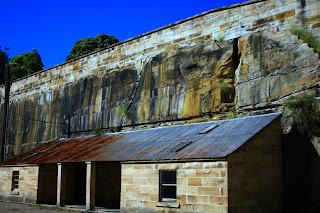| A unique design in the wall ensuring that the building imploded if there was a 'problem'. He explained how it worked but ... duh! |
Goat Island's usage can be neatly categorised by century.
During the 19th century it housed convicts who were used to quarry and cut the sandstone for use on the island and in the town. The strutures so built were used to house gun-powder.
During the 20th century the island was used to house water and police patrols and extensivley as a ship-building dock.
During the 21st century the island will be used as a vehicle to introduce the people of the city to their own history.
Left: 1870 photographed to the south from the north shore showing Balmain behind the island;
Right: about 1910 once again from the north shore but this time more in a SEE directon showing Balmain and part of Darling Harbour |
The quarrying commenced in 1826 when Governor Darling moored the hulk Phoenix off the island to use its convicts as labourers to build a naval arsenal. However, its use as a quarry, although intensive, was short-lived when the new governor, Bourke and Thomas Mitchell realised they would end up with no island at all!
There was a need to store the huge quantities of highly explosive black gunpowder used around the town, and the island was perfect. As hundreds of wooden barrels were required for storage, coopers and a cooperage were also required.
Top Left: the walls and buttresses of the powder magazine;
Top Right: The cooperage along a hewn sandstone wall
Below: the facade of the Queens Powder Magazine. |
George Barney was the engineer in charge from 1836. He had already constructed Victoria Barracks, Circular Quay and completed Busby's Bore. Progress was slow as the 171 convicts only worked hard enough to stay out of stife, had to wear shackles and were shipped on and off each day. Barney solved all these issues. He's one of my heroes this bloke. The works were completed by the end of the decade and the convicts moved on to hacking away on Cockatoo Island - another beaut day trip.
| The inside and structure of the magazine. The guide, David, was well informed, enthusiastic and had a great sense of humour. |
In 1861 there was over 7,000 barrels of gunpowder stored on the island – equal to about one million pounds of gunpowder, enough to blow half of Sydney sky high.
| Left: aerial view in 1951; Right: aerial view in 2002 |
National Parks & Wildlife is readying the island to open to the general public by regular ferry from CQ, probably by the end of 2010. In the interim, they are open to groups. I went with a group from the Maritime Museum. Early in July I am going with a Historic Houses group for a dramatised day linking Hyde Park Barracks with Goat Island entitled 'Escape of the Cracksmen'. Hope they dress up!!
| The view from Goat Island early in 1930 |

.jpg)







.jpg)
.jpg)

12 comments:
Interesting place. Nice history lesson.
Costas
Fascinating history Julie. What an interesting place to visit.
What an awesome and fascinating post! I am quite intrigued by this island and it's history! And the wonderful pictures!
Insteresting stuff. I haven't explored any of the harbour islands yet.
Sydney - City and Suburbs
That's some great stuff there.
Another interesting spot. Can you just go out there or do you have to do a tour?
I like the two brigde shots the bottom one today and the top one yesterday. OLD and NEW.
Great 'Sir Richard Bourke' plaque - best I've seen.
I love your adventures .. of course if it was me I'd make my readers suffer through a whole week or more to get through the day trip ... but your life is teaming with too many adventures to go so slow.
"realised they would end up with no island at all" made me chuckle.
Interesting history and nice place?
Serge
There is so much interesting history here. great shots too."Enough gunpowder to blow away half of Sydney", a bit like Lucas Heights.
Fascinating history. "Escape of the Cracksmen," huh? We'll want to see pics!
*grin* ... cool it LV ... I think they are gunmen!
Post a Comment